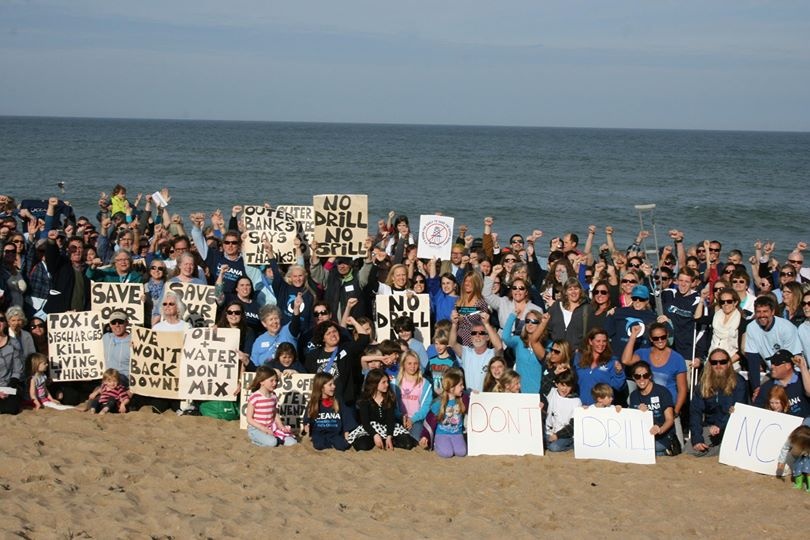Atlantic drilling opponents speak out in record numbers

Opponents of Atlantic drilling have turned out in record numbers at public forums in hopes of persuading the Obama administration to halt plans to open an area of the Atlantic from Virginia to Georgia to oil and gas development. Here people gather outside a forum held earlier this year on North Carolina's Outer Banks. (Photo by Randy Sturgill, Oceana.)
When the Obama administration released the initial schedule of public meetings to take comments on the proposal to open an area of the Atlantic from Virginia to Georgia to offshore oil and gas drilling, it didn't plan to hold one on North Carolina's Outer Banks until U.S. Rep. Walter Jones (R-N.C.) and the Dare County Commission stepped in and requested one.
That meeting was held on Monday, March 16 in Kill Devil Hills, N.C. and drew 670 people -- the largest-ever attendance at a Bureau of Ocean Energy Management (BOEM) hearing, according to Environment North Carolina. The overwhelming majority of attendees opposed the drilling plan.
"For an area like the Outer Banks, any threat to our shores and waters poses an existential threat to our community," Lee Nettles, executive director of the Outer Banks Visitors Bureau, said during a press conference held in conjunction with the meeting. The Outer Banks Chamber of Commerce also recently restated its opposition to offshore oil and gas exploration.
Others who spoke against offshore drilling at the press conference included the mayors of the Outer Banks communities of Kill Devil Hills, Nags Head and Duck.
"As residents of the Outer Banks, we would bear the brunt of the risk and reap no financial benefit," said Duck Mayor Monica Thibodeau. "Experiencing even a minor mishap off our shoreline would cost our community hundreds of jobs and thousands of lives would be gravely impacted."
A previous public meeting on the Atlantic drilling proposal held in Wilmington, North Carolina also drew a large crowd, with almost 400 people signing up to speak -- nearly twice as many as attended earlier hearings in Washington, D.C. and Norfolk, Virginia combined. BOEM scheduled a total of nine meetings for the Atlantic region, with the final one set for Tuesday, March 24 in Savannah, Georgia.
Given the intense public concern in North Carolina over the drilling proposal, the Southern Environmental Law Center (SELC), which opposes Atlantic drilling, held a daylong forum on the topic on Thursday, March 12 in Chapel Hill. The afternoon portion of the program featured scientific experts discussing the potential impact of offshore drilling on the Atlantic coast. The evening session featured clips from the documentary film "The Great Invisible" about the aftermath of the BP disaster (watch the preview below) and commentary by director Margaret Brown as well as remarks by environmental activists from the Gulf Coast about what it's like to live with offshore oil and gas development and the coastal wetlands loss it causes.
"How much wetlands will be destroyed?" said Cyn Sarthou, executive director of the New Orleans-based Gulf Restoration Network. "You all need to be asking questions."
Environmental activists and coastal residents are not the only ones questioning the wisdom of Atlantic oil and gas development: Earlier this month, 75 leading ocean scientists from institutions including Duke University and the University of North Carolina sent a letter to President Obama urging him to scrap the proposal to conduct seismic blasting for locating offshore oil and gas reserves in the region, the first step toward drilling. It marks the first time a group of prominent scientists has raised concerns about the effects of seismic blasting on marine life.
"The Interior Department's decision to authorize seismic surveys along the Atlantic coast is based on the premise that these activities would have only a negligible impact on marine species and populations," the scientists wrote. "Our expert assessment is that the Department's premise is not supported by the best available science. On the contrary, the magnitude of the proposed seismic activity is likely to have significant, long-lasting, and widespread impacts on the reproduction and survival of fish and marine mammal populations in the region, including the critically endangered North Atlantic right whale, of which only 500 remain."
To date, more than 200 national, state and local elected officials have taken a public stance against seismic air gun blasting and/or offshore drilling in the Atlantic, while more than 40 coastal towns and cities from Florida to New Jersey have passed resolutions opposing or expressing concerns with the plans. BOEM will be accepting public comments on the drilling proposal through March 30; for details on how to submit comments, click here.
"I'm hopeful that we'll be able to ultimately retain longstanding protections of the East Coast," U.S. Rep. David Price (D-N.C.), told last week's SELC gathering. "But that's not likely to happen without a fight."
Tags
Sue Sturgis
Sue is the former editorial director of Facing South and the Institute for Southern Studies.
